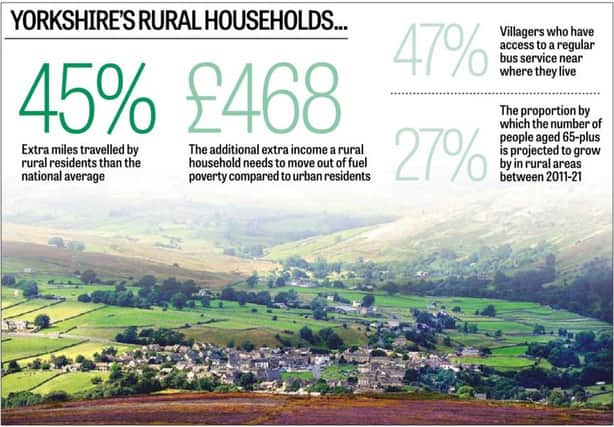Four-year plan tackles dearth of cheaper homes in exodus fight


Just 16 per cent of the population of Richmondshire are people aged 19 and under, half the proportion of children and young people who lived in the area at the start of the 1980s.
The trend is in part blamed on young families being priced out of the area, creating a rural exodus which threatens the future viability of remote communities.
Advertisement
Hide AdAdvertisement
Hide AdWith living costs in rural areas also high, wages generally low and public services being hit by austerity cuts, many younger people are leaving the villages they grew up in. A special report by The Yorkshire Post in November outlined these issues ahead of a summit meeting to discuss ways forward, held jointly with Richmondshire District Council.
Nationally, lower end house prices in rural areas are around eight times more than a lower end annual wage. In Richmondshire the average house price is around £217,800 and the average household income of a local family, £22,100. These stark figures saw the district council give a task force of council officers six months to examine whether the council has the means at its disposal to resume a house building programme of its own.
A report documenting its findings to be presented at a meeting of councillors on Tuesday, recommends using an existing fund, the council’s Housing Revenue Account (HRA) which is ring fenced for the management and maintenance of the council’s housing stock, to deliver a supply of ten new affordable homes every 12 months for the next four years.
This supply could be achieved through three avenues: by using financial contributions paid by housing developers, and by using the HRA to build new homes or to buy properties on the open market.
Advertisement
Hide AdAdvertisement
Hide AdBut the progress of a separate, eye-catching proposal, for the council to set up an arms-length trading company is in doubt. ‘The Mercury Trading Co Ltd’, has been earmarked as a way to build or purchase new housing for rent however its immediate financial viability has been questioned.
The intention would be for the company’s rental income to sustain its operations independently from the council, paving the way for an ongoing investment in building or acquiring new homes to rent.
Some £250,000 of grant funding, a portion of Richmondshire’s share of the New Homes Bonus from central government, is earmarked to get the trading company started, but after further investigation council officers are recommending that for now it serves as a reserve option.
A challenge in pursuing this initiative is its capability to sustain rental income to allow it to repay the borrowing that would be needed to acquire and build new affordable properties. Under ‘state aid’ rules, the council is unable to subsidise the company which effectively means it would have to charge the company market rates for interest on borrowing.
Advertisement
Hide AdAdvertisement
Hide AdAnd on the basis that rent levels are set at the maximum an occupier can claim for housing benefits, the trading company model is not a financially viable proposition in the short to medium term. The company will take too long to be self-sufficient and will require significant investment from the council, the report warns.
Callum McKeon, corporate director and monitoring officer at Richmondshire District Council, insisted that progress was being made towards tackling the affordable homes shortage, and that the trading company may well become a viable option as the government reviews its housing policy after the General Election.
“The report has concluded that the quickest and easiest way for Richmondshire District Council to deliver new affordable homes is through our existing housing powers and budgets,” Mr McKeon said.
“Mercury Housing Co may still have a very useful role in the light of the recent government statements indicating that they may apply the Right to Buy principles to housing association properties.”
Advertisement
Hide AdAdvertisement
Hide AdHe added: “We are having difficulty in attracting new young families into rural areas and housing is a key reason, so if we can sort that out as well as create new jobs and improve broadband connections, then they are all pieces of the jigsaw.”
READ MORE...